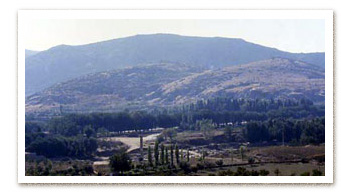

1. Gods, heroes, and personifications at Ephesus
The legendary founder of Ephesus was Androklos, son of king Kodros of Athens. Before departing for Ionia, Androklos received an oracle from Apollo at Delphi: it said that he should establish his city "where a fish will show (the way) and a boar will lead (the way)." On landing on the coast, the colonists caught fish and began to cook them, but one fish leaped out of the pan, scattering coals and setting the underbrush aflame, out of which a boar ran ( 1 ); Androklos chased ( 2 , 3 ) and killed it, and where it fell he established the city.

View to Artemision and Landscape of Ephesus.
The Fortune of Ephesus (Greek Tyche) was basically a personification of the city itself. Every city had such a goddess, who is often represented as crowned with the city's walls, or with the tall polos crown of a goddess, and holding a cornucopia to symbolize abundance. Ephesus' goddess is explicitly identified in Latin, as "Fortuna Ephesia," on coin ( 4 ). Here she holds a rudder along with her cornucopia, symbolizing her power as a seaport. The same image was used on Ephesus' coins ( 5 ), especially those celebrating its concord with Alexandria, another famous port. On another coin ( 6 ) the "Tyche of Ephesus" is again explicitly identified, this time in Greek; and instead of the rudder, she holds a small image of Artemis, the city's patron goddess. This means that the city's possession of the great temple of Artemis, rather than its harbor, is being emphasized; after all, even a goddess only has two hands.
The image of Ephesus' patron goddess Artemis is by far the most frequent on its coins, but other gods specific to the city also appear. Coins 7 and 8 show the city's Zeus Olympios, who had a sanctuary, the Olympieion, somewhere between the city's southern (Magnesian) gate and the Temple of Artemis. He shows his relationship with the goddess by exalting her image. Ephesus, as an Ionian city, claimed Athena's city Athens as its metropolis; and Androklos was the son of a king of Athens. Indeed, a sanctuary of Athena was built at the spot where Androklos killed the boar and established the city of Ephesus.
Ephesus also honored its rivers: the river Kaystros (today's Küçük Menderes), for example, was said to be the father of Ephesus, the city's eponym. River gods were usually portrayed as young men reclining ( 9 ), often holding reeds and leaning on a jug from which water flows. Some coins explicitly name the Ephesian river gods (tributaries of Kaystros) they illustrate: Marnas ( 10 ), Kenchreios, or Klaseas.









